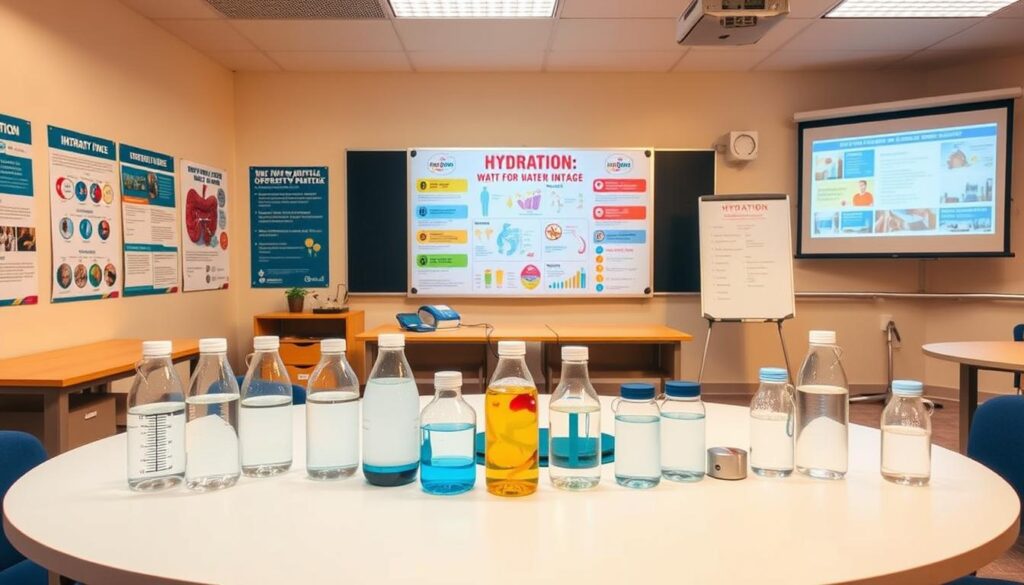Did you know that 60% of the human body is composed of water? This vital fluid plays a crucial role in maintaining life, from supporting cellular functions to regulating body temperature. Without it, the body cannot perform even the most basic tasks effectively1.
Maintaining fluid balance is essential for overall health. Research shows that water is critical for metabolic processes, nutrient absorption, and even kidney function. Inadequate fluid levels can lead to issues like fatigue, unclear thinking, and constipation2.
This article explores how water supports the body’s systems and why it’s vital to meet daily fluid needs. From preventing dehydration to boosting energy, understanding its role can transform your health.
Key Takeaways
- Water makes up 60% of the human body, highlighting its importance for life1.
- Fluid balance is essential for metabolic and cellular functions2.
- Inadequate water levels can lead to fatigue and health issues2.
- Daily fluid needs vary by age, sex, and activity level2.
- Water supports kidney function and nutrient absorption1.
Understanding the Importance of Hydration
The human body relies on consistent fluid levels to function effectively. Without sufficient fluids, even mild deficits can impair cognitive and physical performance3. Maintaining fluid balance is essential for sustaining energy, mental clarity, and overall health.
The Impact on Overall Health and Energy
Fluid balance plays a critical role in regulating vital functions. Studies show that mild dehydration, as little as 2% fluid loss, can reduce cognitive function and lead to fatigue3. This highlights the importance of meeting daily fluid needs to support mental and physical performance.
Research also indicates that increasing fluid intake can enhance physical activity performance. For example, staying hydrated helps maintain joint lubrication, which is crucial for movement3. Additionally, fluids aid in temperature regulation, especially during exercise or in hot environments.
“Even mild dehydration can impair cognitive function and reduce physical performance, emphasizing the need for consistent fluid intake.”
A Brief Overview of Water’s Role in the Body
Water is involved in nearly every bodily function. It supports nutrient transport, waste removal, and temperature regulation4. For instance, cartilage in joints contains approximately 80% water, which helps reduce friction during movement3.
Dehydration can disrupt these processes, leading to complications like headaches, fatigue, and even kidney stones4. Ensuring adequate fluid intake is vital for maintaining these functions and preventing health issues.
| Function | Role of Fluids |
|---|---|
| Cognitive Performance | Supports focus and mental clarity |
| Physical Activity | Enhances endurance and joint lubrication |
| Nutrient Transport | Facilitates absorption and distribution |
| Waste Removal | Aids in detoxification processes |
By understanding the body’s demand for fluids, individuals can make informed choices to support their health and performance. Staying hydrated is a simple yet powerful way to enhance daily life.
The Role of Water in Digestive Function
Efficient digestion depends on maintaining adequate fluid levels in the body. Without sufficient fluids, the digestive system struggles to break down food and absorb nutrients effectively5. This section explores how fluids support digestive enzymes and enhance nutrient absorption.
How Water Aids Digestive Enzymes
Fluids are essential for the activation and function of digestive enzymes. These enzymes rely on water to break down carbohydrates, proteins, and fats into smaller molecules6. For example, saliva, which contains digestive enzymes, is primarily composed of water. This fluid helps initiate the digestion process in the mouth.
In the stomach and intestines, water continues to play a vital role. It ensures that enzymes can efficiently process food, making nutrients available for absorption5. Without adequate fluids, enzyme activity slows down, leading to incomplete digestion and potential discomfort.
Enhancing Nutrient Absorption
Daily fluid consumption is crucial for nutrient absorption. Water helps dissolve nutrients, allowing them to pass through the intestinal lining and enter the bloodstream6. For instance, vitamins like B and C, which are water-soluble, require sufficient fluids for proper assimilation.
Studies show that increased fluid levels enhance the absorption of essential minerals like calcium and magnesium5. This process not only supports metabolic health but also boosts energy levels throughout the day.
| Process | Role of Fluids |
|---|---|
| Enzyme Activation | Supports the breakdown of food |
| Nutrient Dissolution | Facilitates absorption in the intestines |
| Waste Elimination | Helps remove undigested food particles |
Maintaining fluid balance is fundamental for optimal gut function. Whether it’s breaking down food or absorbing nutrients, water is a key player in the digestive process6. By staying hydrated, individuals can support their digestive health and overall well-being.
Hydration: Proper water intake is emphasized for optimal digestive function
Maintaining consistent fluid levels is critical for supporting the body’s systems. Inadequate fluid consumption can lead to a sluggish digestive system, impairing the absorption of essential vitamins and minerals7. This highlights the direct impact of fluids on overall health and well-being.
Water-rich foods like fruit, vegetables, and juice play a complementary role in maintaining fluid balance. For example, watermelon and cucumbers are over 90% water, making them excellent choices for staying hydrated8. These foods not only provide fluids but also essential nutrients that support bodily functions.
The synergy between drinking fluids and consuming water-dense foods enhances hydration effectiveness. Studies show that a balanced diet rich in these foods can improve nutrient absorption and support metabolic processes7. This combination ensures the body remains efficient and energized throughout the day.
| Food Source | Water Content |
|---|---|
| Watermelon | 92% |
| Cucumber | 95% |
| Orange Juice | 88% |
Scientific findings emphasize that a diet rich in hydrating foods enhances the body’s ability to maintain fluid balance. This approach not only supports digestive health but also promotes overall vitality8. By integrating these foods into daily meals, individuals can achieve optimal hydration and improved well-being.
How Hydration Influences Overall Health
Staying hydrated plays a vital role in maintaining overall health, from glowing skin to sharp mental clarity. Emerging evidence shows strong links between adequate fluid levels and improved physical and mental performance9. This section explores how maintaining fluid balance benefits various aspects of well-being.
Benefits on Skin, Cognitive Function, and Metabolism
Fluid intake is essential for maintaining healthy, radiant skin. Proper hydration helps keep skin cells plump and reduces the appearance of fine lines10. Additionally, it supports the skin’s natural barrier, protecting against environmental damage.
Cognitive function also relies on adequate fluid levels. Studies show that even mild dehydration can impair focus, memory, and decision-making9. Staying hydrated ensures the brain functions optimally, enhancing mental clarity and productivity.
Metabolism benefits significantly from proper hydration. Fluids aid in nutrient transport and waste elimination, supporting efficient metabolic processes10. Monitoring urine color, such as pale yellow, can help gauge hydration status and ensure metabolic health9.
“Maintaining fluid balance is key to supporting skin health, cognitive performance, and metabolic efficiency.”
Research highlights that hydration impacts physical performance as well. Athletes, for example, require higher fluid intake to maintain endurance and prevent fatigue10. This underscores the importance of tailoring fluid consumption to individual needs and activity levels.
In summary, staying hydrated offers a wide range of health benefits. From glowing skin to sharp thinking and efficient metabolism, fluid intake is a cornerstone of overall well-being. By paying attention to hydration, individuals can enhance their health and performance in meaningful ways.
Physiological Mechanisms Behind Fluid Balance
The body’s ability to maintain fluid balance is a complex process involving multiple systems. It relies on precise homeostatic mechanisms to ensure stability, even under varying conditions11. These processes are critical for sustaining life and optimizing bodily functions.
Homeostatic Regulation and Thirst
Homeostasis ensures that fluid levels remain within a narrow range. When the body detects a deficit, it triggers thirst, prompting the individual to seek fluids12. This response is mediated by the hypothalamus, which monitors blood osmolality and volume.
Anticipatory reflexes from taste and gut sensors also play a role. They help curb thirst before dehydration sets in, ensuring proactive fluid consumption11. This mechanism is particularly important during periods of increased heat or physical activity.
Kidney Function and Urine Osmolality
The kidneys are central to regulating fluid balance. They adjust urine osmolality based on the body’s needs, conserving water during deficits and excreting excess when necessary11. This process is influenced by hormones like antidiuretic hormone (ADH).
During heat exposure, the kidneys work harder to maintain balance. Studies show that fluid deficits can lead to concentrated urine, signaling the need for increased drinking12. This highlights the kidneys’ adaptability in response to environmental challenges.
“The kidneys’ ability to regulate urine concentration is a cornerstone of fluid balance, ensuring the body remains hydrated even under stress.”
External factors like heat can strain these mechanisms. Prolonged exposure to high temperatures increases fluid loss through the skin, requiring compensatory adjustments11. Understanding these processes helps individuals make informed choices about fluid consumption.
Impact of Physical Activity and Environmental Factors on Water Intake
Physical activity and environmental conditions play a significant role in determining fluid needs. When engaging in exercise, the body loses fluids through sweat, which must be replenished to maintain balance13. Similarly, factors like heat and humidity can increase fluid loss, making it essential to adjust intake accordingly.
Exercise-Related Fluid Loss
During physical exertion, the body produces sweat to regulate temperature. Studies show that sweat rates can reach 2 to 3 liters per hour in hot conditions14. This fluid loss can lead to dehydration if not addressed, impairing performance and increasing fatigue13.
Research indicates that a 2% decrease in body weight due to fluid loss can negatively impact athletic performance13. For example, dehydration can reduce endurance, strength, and cognitive function, making it crucial to monitor fluid intake during exercise15.
Temperature, Heat, and Humidity Considerations
Environmental factors like heat and humidity amplify fluid loss. In hot climates, the body works harder to cool itself, increasing sweat production14. This can lead to faster dehydration, especially during prolonged activities.
High humidity levels also hinder sweat evaporation, reducing the body’s ability to cool down. This can elevate core temperature, increasing the risk of heat-related illnesses14. Monitoring these factors helps individuals tailor their fluid intake to prevent dehydration.
| Activity Level | Fluid Loss Rate | Recommended Intake |
|---|---|---|
| Light Exercise | 0.5-1 liter/hour | 17-20 ounces pre-exercise |
| Moderate Exercise | 1-2 liters/hour | 7-10 ounces every 10-20 minutes |
| Intense Exercise | 2-3 liters/hour | 16-24 ounces per pound lost |
Understanding how physical activity and environmental factors influence fluid needs is key to maintaining balance. By monitoring sweat rates and adjusting intake, individuals can optimize performance and prevent dehydration15.
Hydration Strategies for Different Age Groups
Fluid needs vary significantly across different stages of life, making tailored strategies essential for maintaining health. Pediatric and geriatric studies highlight that age, activity levels, and metabolic rates influence these requirements16. Understanding these differences ensures that individuals of all ages can maintain proper fluid balance.
Children’s Unique Hydration Needs
Children require more fluids relative to their body size compared to adults. Their higher metabolic rates and increased activity levels lead to greater fluid loss17. For example, children aged 4-8 need approximately 4-6 cups of fluids daily, while older children may require up to 8 cups17.
Temperature changes also play a significant role in children’s fluid needs. In hot weather, their bodies lose fluids faster, increasing the risk of dehydration18. Engaging techniques like water challenges or flavored drinks can encourage consistent fluid consumption.
Addressing Hydration for the Elderly
Older adults face unique challenges in maintaining fluid balance. Diminished thirst sensation and impaired kidney function make them more susceptible to dehydration17. Studies show that even mild dehydration can lead to cognitive decline and fatigue in this age group18.
Strategies to ensure adequate hydration include setting reminders to drink fluids and incorporating water-rich foods like soups and fruits16. Monitoring urine color, aiming for light yellow, can also help gauge hydration status18.
“Tailored hydration strategies are essential for supporting health across all age groups, from active children to older adults.”
Understanding the importance of age-specific hydration strategies can significantly improve health outcomes. By addressing the unique needs of children and the elderly, individuals can maintain fluid balance and support overall well-being17.
Guidelines on Daily Water Intake
Understanding daily fluid needs is essential for maintaining health and energy levels. Tailored recommendations ensure individuals meet their unique requirements based on factors like weight, activity, and climate19.
Recommended Fluid Intake for Adults
Most healthcare professionals suggest that a healthy adult requires 2-3 liters of fluids per day, equivalent to 8-12 cups19. This amount supports bodily functions like digestion, nutrient absorption, and waste removal20.
For personalized guidance, a simple formula can be used: multiply your weight in pounds by 0.5 to determine the ounces of fluids needed daily19. For example, a 180-pound person should aim for 90 ounces.
Adjusting Intake Based on Activity and Climate
Physical activity and environmental conditions significantly influence fluid needs. During exercise, the body loses fluids through sweat, requiring additional intake to maintain balance19. Healthcare professionals recommend drinking 12 ounces of fluids every 30 minutes during a workout19.
In hot or humid climates, fluid loss increases due to higher sweat rates. Adjusting intake to compensate for these conditions helps prevent dehydration and supports digestion and overall health20.
| Activity Level | Fluid Loss Rate | Recommended Intake |
|---|---|---|
| Light Exercise | 0.5-1 liter/hour | 17-20 ounces pre-exercise |
| Moderate Exercise | 1-2 liters/hour | 7-10 ounces every 10-20 minutes |
| Intense Exercise | 2-3 liters/hour | 16-24 ounces per pound lost |
Monitoring signs like thirst, fatigue, and urine color can help gauge hydration status. Light yellow urine typically indicates adequate fluid levels19. By following these guidelines, individuals can ensure they meet their daily fluid needs and support their health.
Hydration and Its Role in Preventing Dehydration Effects
Dehydration can silently disrupt bodily functions, leading to immediate and long-term health complications. Mild dehydration, defined as a 1-2% loss of body fluids, can impair cognitive performance and reduce physical endurance17. Recognizing the signs early is crucial for maintaining overall health.
The physiological need for fluids is undeniable. Without adequate intake, the body struggles to regulate temperature, transport nutrients, and remove waste21. This imbalance can lead to fatigue, dizziness, and even mood disorders, as seen in studies linking low fluid consumption to increased depression risk17.

Environmental factors like climate significantly influence fluid loss. In hot or humid conditions, the body loses fluids faster through sweat, increasing the risk of dehydration21. Proactive strategies, such as monitoring urine color and increasing fluid intake during heat exposure, can help counteract these effects.
“Even mild dehydration can impair cognitive function and reduce physical performance, emphasizing the need for consistent fluid intake.”
Practical steps to prevent dehydration include:
- Drinking fluids regularly, especially during physical activity or in hot climates21.
- Incorporating water-rich foods like watermelon and cucumbers into daily meals21.
- Recognizing early signs such as thirst, dry mouth, and dark-colored urine21.
By understanding the body’s need for fluids and addressing climate-related challenges, individuals can safeguard their overall health and prevent the adverse effects of dehydration17.
The Science Behind Hydration: Research and Studies
Scientific research continues to uncover the intricate connections between fluid consumption and systemic health. Recent studies highlight how water content in foods and beverages plays a pivotal role in maintaining overall well-being22.
Current Findings on Water Intake and Health
Peer-reviewed studies reveal that water content in diets significantly impacts health outcomes. For instance, inadequate fluid consumption can dehydration lead to complications like fatigue and impaired cognitive function23.
Breakthrough research has established a strong link between hydration and improved metabolic function. Studies show that increased fluid intake enhances nutrient absorption and supports efficient waste removal22.
Quantitative data highlights the importance of incorporating high-water-content foods into daily diets. Foods like watermelon and cucumbers, which are over 90% water, contribute significantly to overall fluid intake23.
“The relationship between hydration and metabolic health is undeniable, with studies showing that even mild dehydration can impair bodily functions.”
Clinical research also emphasizes the role of fluids in preventing chronic conditions. For example, low fluid consumption is linked to a higher risk of kidney stones and other health issues24.
| Food Source | Water Content |
|---|---|
| Watermelon | 92% |
| Cucumber | 95% |
| Orange Juice | 88% |
Understanding the science behind hydration helps individuals make informed choices about their fluid intake. By focusing on content and incorporating water-rich foods, one can support their health and prevent dehydration lead complications22.
Practical Tips for Boosting Water Intake Throughout the Day
Simple changes in daily habits can significantly improve fluid consumption and overall health. By making small adjustments to your environment and routine, you can ensure consistent fluid intake without feeling overwhelmed.
Innovative Ways to Flavor and Enhance Water
Adding natural flavors to your drinks can make them more appealing. Try infusing water with slices of lemon, cucumber, or mint for a refreshing twist. This method not only enhances taste but also encourages you to drink more throughout the day25.
Using a reusable bottle with time markers can help track your progress. Smart bottles like the HidrateSpark PRO send reminders to drink, ensuring you stay on track25.
Incorporating High-Water Content Foods into Your Diet
Foods like watermelon, cucumbers, and leafy greens are excellent sources of fluids. Including these in your meals can boost your daily intake without relying solely on drinking25.
For example, a salad with lettuce, tomatoes, and cucumbers can provide both hydration and essential nutrients. This approach is especially useful for those who struggle to drink enough fluids20.
| Food Source | Water Content |
|---|---|
| Watermelon | 92% |
| Cucumber | 95% |
| Spinach | 91% |
Setting reminders on your phone or using apps can also help maintain steady hydration levels. Small changes, like keeping a bottle on your desk or choosing water-rich snacks, can make a big difference in your daily routine25.
By adapting your environment and incorporating these practical tips, you can easily boost your fluid intake and support your overall health20.
Implementing Hydration Education and Resources
Community and healthcare initiatives are reshaping how individuals approach their daily fluid consumption. These efforts focus on raising awareness about the importance of proper drinking water habits and their impact on overall health26.

Local programs and clinical guidelines are leading the charge. For example, schools and clinics often host workshops to educate participants about the role of fluids in absorption and nutrient transport27. These programs emphasize practical strategies for maintaining fluid balance, especially during exercise or in hot climates.
Community and Healthcare Initiatives
Healthcare providers are increasingly involved in promoting hydration awareness. Studies show that community-based programs can significantly improve fluid intake habits. For instance, a recent initiative targeting young athletes demonstrated measurable improvements in hydration levels27.
Clinical guidelines also advocate for tailored approaches. Registered dietitians play a key role in developing interventions that address specific needs, such as increased fluid requirements during exercise26. These efforts are particularly important for vulnerable populations, including the elderly and those with chronic conditions.
“Community programs and clinical guidelines are essential for fostering healthy hydration habits and improving overall well-being.”
Building Healthy Hydration Habits at Home
Creating a supportive environment at home is crucial for long-term success. Simple strategies, like keeping a reusable drinking water bottle accessible, can encourage consistent fluid intake26.
Parents can also model healthy habits for their children. For example, incorporating water-rich foods into meals and setting reminders to drink fluids can make a significant difference27. These practices not only support hydration but also promote overall health.
| Strategy | Impact |
|---|---|
| Reusable Bottles | Encourages consistent fluid intake |
| Water-Rich Foods | Boosts hydration and nutrient absorption |
| Reminders | Helps maintain daily fluid goals |
By combining community initiatives with home-based strategies, individuals can build lasting habits that support their health and well-being26.
Conclusion
Maintaining fluid balance is essential for overall health and well-being. Consistent daily water intake supports vital functions like nutrient transport, waste removal, and temperature regulation28. Without adequate fluids, the body can experience fatigue, impaired focus, and even long-term health issues29.
Research highlights the benefits of staying hydrated, from improved cognitive performance to enhanced physical endurance. Monitoring urine color, aiming for light yellow, is a simple way to gauge hydration status29. Incorporating water-rich foods like cucumbers and watermelon can also boost fluid levels naturally28.
Adopting practical strategies, such as using reminders or carrying a reusable bottle, can help maintain consistent fluid intake. These small changes contribute to long-term health and vitality. Prioritize daily water intake and make staying hydrated a cornerstone of your wellness routine.
FAQ
How does staying hydrated affect digestive health?
What are the signs of dehydration to watch for?
How much fluid should an adult consume daily?
Can foods contribute to daily fluid needs?
How does physical activity influence fluid requirements?
What role does climate play in hydration needs?
Are there specific hydration needs for children and the elderly?
How can someone increase their fluid intake throughout the day?
What are the benefits of staying hydrated for skin health?
How does hydration impact cognitive function?
Source Links
- 15 benefits of drinking water and other water facts – https://www.medicalnewstoday.com/articles/290814
- About Water and Healthier Drinks – https://www.cdc.gov/healthy-weight-growth/water-healthy-drinks/index.html
- Why Should Older Adults Stay Hydrated? – https://www.ncoa.org/article/10-reasons-why-hydration-is-important/
- The Importance of Hydration: How Water Intake Affects Your Health – https://dramitsood.com/the-importance-of-hydration-how-water-intake-affects-your-overall-health/
- Water, Hydration and Health – PMC – https://pmc.ncbi.nlm.nih.gov/articles/PMC2908954/
- How much water do you need to stay healthy? – https://www.mayoclinic.org/healthy-lifestyle/nutrition-and-healthy-eating/in-depth/water/art-20044256
- Prime Scholars | Open Access Journals | Peer Reviewed Journals – https://www.primescholars.com/articles/hydration-and-digestion-the-essential-connection-131634.html
- The Power of Hydration: Why Staying Hydrated Is Essential for Your Health and Well-being — Warren General Hospital – https://www.wgh.org/news/the-power-of-hydration-why-staying-hydrated-is-essential-for-your-health-and-well-being
- Does Water Help Gut Health? Exploring the Essential Role of Hydration for Digestive Wellness – https://cymbiotika.com/blogs/health-hub/does-water-help-gut-health-exploring-the-essential-role-of-hydration-for-digestive-wellness?srsltid=AfmBOoqezviQRQyEZwlrFUxS312QqeI7OhEvAAFQeIwAkOc3tYcquTDK
- The importance of hydration – https://www.bda.uk.com/resource/the-importance-of-hydration.html
- The Importance of Optimal Hydration in Patients with Heart Failure—Not Always Too Much Fluid – https://www.mdpi.com/2227-9059/11/10/2684
- 4 Water | Dietary Reference Intakes for Water, Potassium, Sodium, Chloride, and Sulfate – https://nap.nationalacademies.org/read/10925/chapter/6
- Hydration and Fitness: How Water Powers Your Workout – https://arsenalhealth.com/importance-of-staying-hydrated/
- Water, Fluids, and Electrolytes – The Science of Hydration – Personal Trainer Certification, Nutrition Courses, Fitness Education – https://www.nestacertified.com/water-fluids-and-electrolytes-the-science-of-hydration/
- Hydration, drinking and exercise performance – https://sems-journal.ch/2439
- Practical Hydration Solutions for Sports – https://pmc.ncbi.nlm.nih.gov/articles/PMC6682880/
- The Impact of Hydration on Physical and Mental Health – https://www.willowshealthcare.com/blog/the-impact-of-hydration-on-physical-and-mental-health
- The Brain-Water Connection: Burjeel Neurologists on Hydration and Cognitive Function – https://burjeel.com/the-brain-water-connection-burjeel-neurologists-on-hydration-and-cognitive-function/
- How Much Water Should You Drink a Day? – https://www.cozymeal.com/magazine/how-much-water-should-you-drink-a-day
- How Much Water Should You Drink Every Day? | Baptist Health – https://www.baptisthealth.com/blog/urology/how-much-water-should-i-drink
- Water 101: The Health Coach’s Guide to Hydration | Functional Medicine Coaching Academy – https://functionalmedicinecoaching.org/blog/water-hydration-101/
- Water Intake, Water Balance, and the Elusive Daily Water Requirement – https://pmc.ncbi.nlm.nih.gov/articles/PMC6315424/
- Healthy Hydration: The Science and Importance of Drinking Water – https://www.news-medical.net/health/Healthy-Hydration-The-Science-and-Importance-of-Drinking.aspx
- Hydration Habits and Water Balance in a Working Population in Greece – https://www.mdpi.com/2072-6643/17/3/371
- 6 Smart Tips for Staying Hydrated Throughout the Day – https://www.everydayhealth.com/dehydration/smart-tips-for-staying-hydrated-throughout-the-day/
- The Importance of Hydration and Nutrition in Patient Care – https://www.cedarhillcare.org/the-importance-of-hydration-and-nutrition-in-patient-care.html
- Educational intervention on water intake improves hydration status and enhances exercise performance in athletic youth – https://pmc.ncbi.nlm.nih.gov/articles/PMC3468721/
- Importance of Hydration: How Internists Recommend Staying Hydrated – https://www.mchllp.com/the-importance-of-hydration-how-internists-recommend-staying-hydrated/
- The Role of Hydration in Maintaining Health – Ekol Hospitals – https://www.ekolhospitals.com/en/the-role-of-hydration-in-maintaining-health




